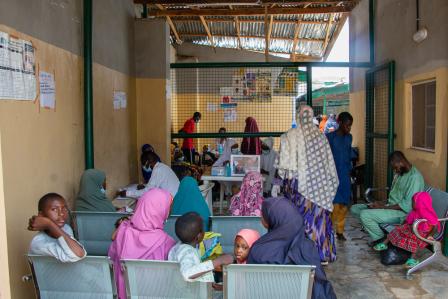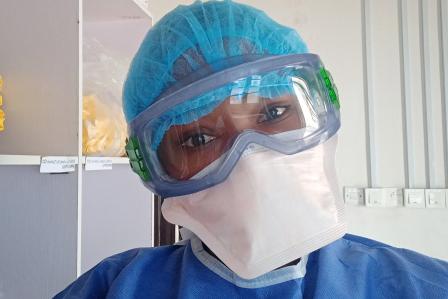Lassa fever: not only a neglected disease, but neglected patients too
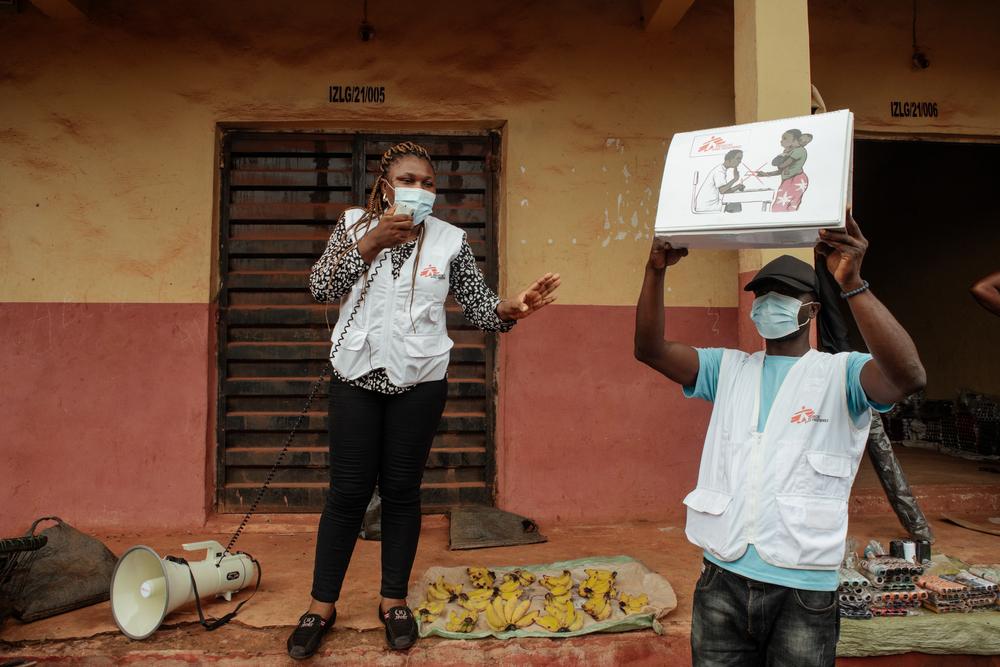
Doctors Without Borders health promoters, Joseph Ibeabuchi (male) and April Ozibo Chinezon (female) educating the public about lassa fever in Abakaliki, Ebonyi State, Nigeria. They are creating awareness about the disease to stop the spread and reduce the stigma towards patients of the disease. Nigeria, 2021. © MSF/Hussein Amri
Nigeria is one of the several West African countries where lassa fever is endemic, yet very little is known about it. Even though lassa fever is a largely neglected disease in Nigeria, people are still getting infected in many states across the country.
“Everything felt strange,” says 14-year-old Nneoma Okonogha, who was treated for Lassa fever – a virus transmitted to humans through contact with food or household items that have been contaminated by rodents. “I thought I was really in a nightmare.”
Once a person is ill with Lassa fever, they can pass it on to others should they contact the infected person's body fluids. Nneoma, along with her sister, Ukamaka and their mother, Priscilla, caught the viral haemorrhagic fever at the same time. All three of them were treated at the Alex Ekweme University Teaching Hospital in Abakiliki (AE-FUTHA), Ebonyi State, Nigeria.
“It was so severe that when the children were shouting in pain, I couldn’t help them because I was also down with pain,” says Priscilla, who also works at the hospital as a civil servant.
In Nigeria, Lassa fever is endemic – cases are found and reported almost every year. But after a severe outbreak in 2018, when more than 600 people were confirmed to be infected, and 171 people died, the World Health Organization deployed a team of specialists from the Nigerian Centre for Disease Control (NCDC) and Nigeria Field Epidemiology and Laboratory Training Program (NFELTP) to several states including Ebonyi.
In March 2018, Doctors Without Borders / Médecins sans Frontières (MSF) started supporting the Lassa treatment centre at AE-FUTHA. Since then, our teams have been working closely with the Ministry of Health (MoH) to treat patients suffering from Lassa fever.
The treatment has proven pertinent for the community, with over 15 patients treated for Lassa fever at the Abakaliki project in the first month of 2022 alone. Across Nigeria, there have been a total of 115 confirmed cases and 26 deaths throughout 30 local government areas in 11 states of the country.
“I contracted Lassa fever in February 2021. When I tested positive, I was shocked to the bone,” says Anastasia, a Lassa survivor from Abakaliki. “It came like malaria, and I bought anti-malaria drugs from a pharmaceutical shop. When I took it for three days, I was still sick. In fact, my situation was worse.”
Anastasia had Lassa fever, but thankfully she was able to access the anti-viral treatment she needed to recover. However, her first assumption that she had malaria is a common one.
- Anastasia Chigoziri Obiomarichi
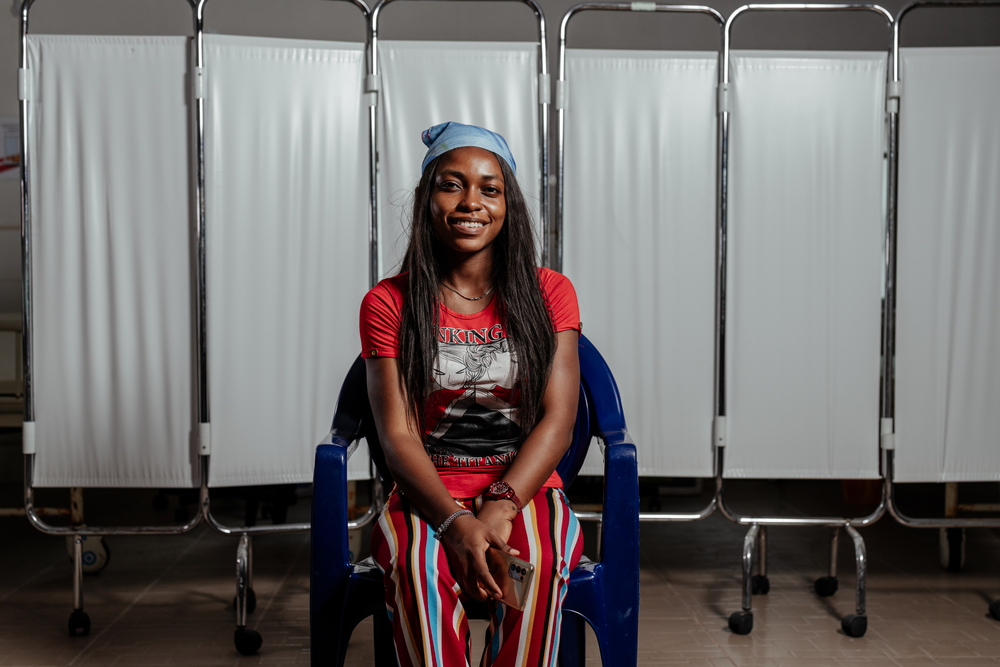
Anastasia Chigoziri Obiomarichi, 24, is a make-up artiste based in Nkaliki, Abakaliki, Ebonyi State, Nigeria. She is also a survivor of Lassa fever. When she first contracted lassa fever, she had thought it was malaria and typhoid infection because two members of her family had been treated of malaria shortly before she took ill. Unfortunately, the treatment only made things worse and shortly after, she was moved to the observation room of the Alex Ekwueme Federal University Teaching Hospital,Abakaliki where she was diagnosed with lassa fever. She says prior to her illness, she never knew what lassa fever was.
“When I tested positive for lassa fever, I was shocked to the bone because I don’t know where it came from. We thought it was normal malaria and typhoid”. Before falling ill, Anastasia says she remembers drinking garri (cassava flakes) with other members of her family which is where she suspects they contracted the illness.
Thanks to Doctors Without Borders, she received treatment and was cured of lassa fever.
“Doctors Without Borders did a lot. They took care of the bill. They disinfected the house to make sure those in the house don’t get infected”
Today, Anastasia, along with other survivors of lassa fever, are collaborating with Doctors Without Borders to create awareness in the communities that lassa fever is not a death sentence and can be cured.
- Okonagha Family
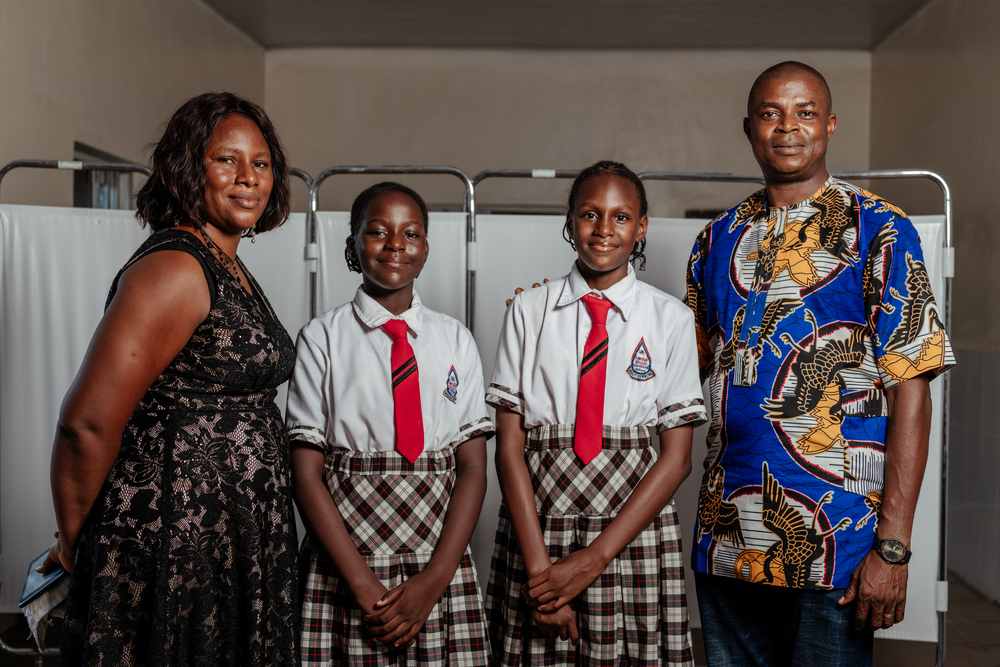
Sitting from left to right is Priscilla Okonagha and her family. In Christmas of 2018, the Okonagha family had a great celebration but this celebration was shortlived. By January 2019, Priscilla Okonagha, a civil servant who works with the Alex Ekwueme Federal University Teaching Hospital (AE-FETHA) along with her two daughters- Diamond Ukamaka Okonagha and Priscy Nneoma Okonagha contracted lassa fever.
Prior to their diagnosis, the healthcare centres they visited had administered malaria medication but there was no improvement.
“From 1st January,2019, I started having abnormality in my body. I thought all I needed was the normal malaria treatment. Eventually, my two daughters fell ill. They were nights we’d be sleeping and they will be shouting in pain but I could not attend to them because I was equally severely ill”.
Mr Martins, Priscilla’s husband, works with the Federal Road Safety Corp in Nigeria. He says that he was scared when test result revealed his family had lassa fever.
“I was very scared, but one thing I remember is that an Doctors Without Borders staff told me that the disease is treatable, that I should not panic”.
Priscy Nneoma Okonagha, one of the children, describes her experience as a nightmare. “I felt strange. It felt weird to me because I had never been admitted to the hospital before. I would tell my mother I wanted ice cream but would never have the appetite to eat it”. However, she became happier after receiving treatment by the Doctors Without Borders team.
Today, the Okonagha family is Lassa fever free thanks to the intervention of the Doctors Without Borders team. “We got wonderful attention here. I commend it because when they commenced treatment, we started seeing slight improvement. I commend the personnel here, from the medical doctor down to the least person because of their dedication to duty”.
- Ikenna Ahaotu
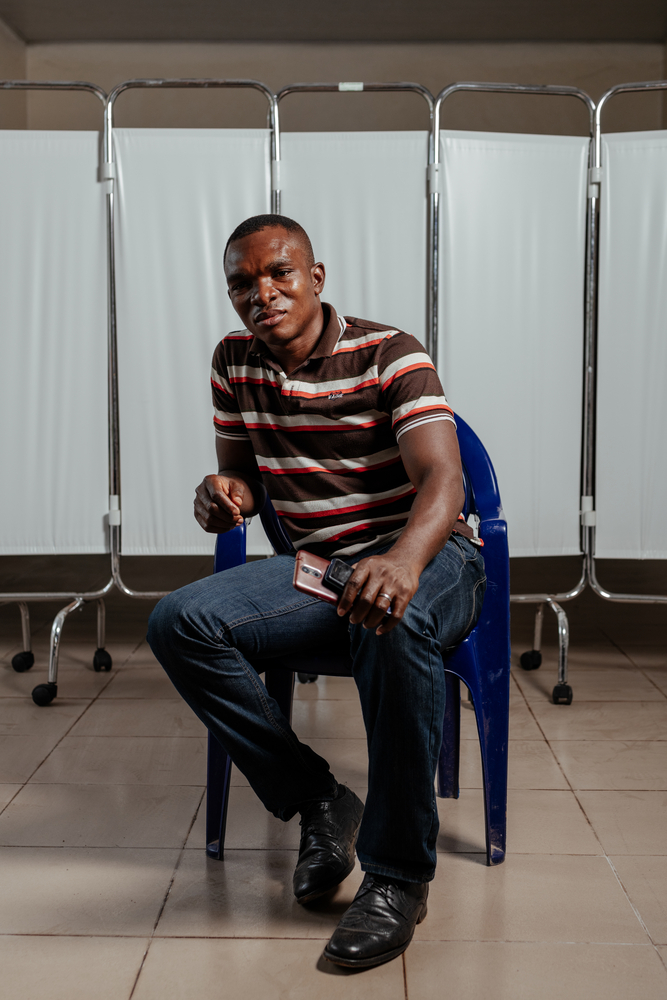
Ikenna is a staff of the Federal Road Safety Corp and comes from Imo state, southeast Nigeria.
When Ikenna started having symptoms of Lassa fever, he thought it was malaria so he self-medicated with malaria drugs. However, the illness only grew worse. He became agitated when it was suspected that he had lassa fever as one medical personnel in a health centre he visited refused to attend to him out of fear.
He got tested by the Doctors Without Borders team at the Alex Ekwueme University Teaching Hospital, Abakaliki where it was confirmed he had lassa fever.
“All I can remember is that after two days, I went into a coma. Even when I came out of coma, I was unconscious for more than two weeks but I was positive because I knew lassa can be cured”.
Though Ikenna is completely healed of lassa today, he says that his illness would not have been complicated had he gotten tested early. He now advocates for people to get tested early and be willing to quarantine.
“Lassa is real, people have to be very careful. Always wash your hands and be hygienically conscious. Make sure you get your house rid of rats. If you notice anything, just go to the hospital”.
Patient stories
Lassa fever symptoms are very similar to malaria, making it difficult to diagnose. Many medical staff don’t have specific training on the detection and treatment of Lassa. As a result, patients often only receive an accurate diagnosis once they are at a severe stage of the disease, which is more challenging to manage.
Since the beginning of our operations on Lassa fever in partnership with the MoH in Ebonyi state, the goal has been to tackle the root causes of Lassa fever and its broad spread impact on infected individuals. A trial of a rapid diagnostic testing (RDT) for Lassa fever is currently at the core of research at AE-FUTHA. If an RDT proves effective, it could help drastically reduce the waiting time for results from a laboratory test.
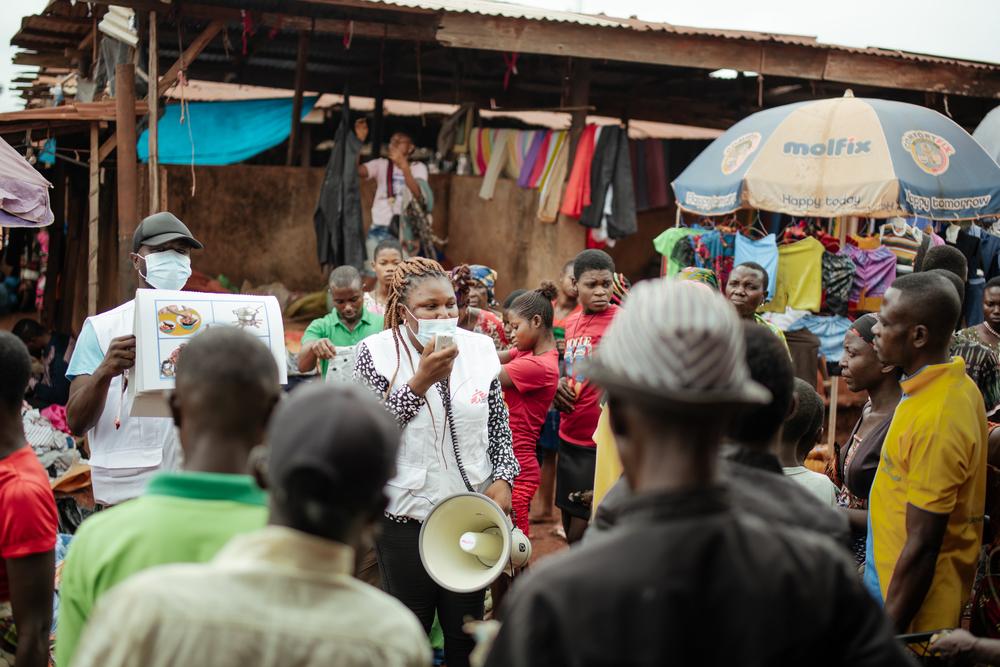
Doctors Without Borders health promoters team is conducting health promotion activity the public about lassa fever in Abakaliki, Ebonyi State. Nigeria, 2021. © MSF/Hussein Amri
“We want to see if the RDT could be a substitute in the management or diagnosis of Lassa fever,” says Okereke Michael Uche , MSF medical doctor. “Timing is important; a patient moves from a mild condition to severe. And when it becomes severe, it is more difficult to manage,” he says.
To ensure continued progress in the fight against Lassa fever, our teams keep a continuous provision of drugs, lab supplies, and personal protective equipment (PPE). We also train AE-FUTHA staff on clinical management and Infection Prevention Control (IPC) for Lassa fever. And to alleviate the psychological impact of the viral disease on infected or suspected patients and their families, mental health support is also provided.
Some people have lost their jobs, been chased out of their own community, or even lost relationships because they were associated with Lassa fever, as a patient or a caregiver.
We work to educate and sensitise communities through a team of health promotors. The team organises community meetings, health talks and awareness campaigns in villages and rural areas across seven local government areas in Ebonyi state.
The purpose of all this is to foster behavioural change; we talk to people one at a time to ensure that everybody gets the message and understands the causes and cures for Lassa.Benjamin Uzoma, health promotion spv.
Five survivors of Lassa fever also work alongside the health promotion teams to educate people about the disease directly from their own experiences with it. “What I did was to share my story,” says Anastasia, a Lassa fever survivor. “This helps other people know that Lassa fever is real, but that it can be cured if you are diagnosed and treated on time,” says Anastasia.
Lassa fever is a serious disease, but when the medical community and the communities are fully engaged and empowered with accurate information, then not only is the stigma reduced – but we can get people timely access to care and they can recover more quickly.Luigi Sportelli, project med. referent
